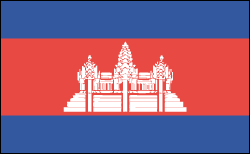Cambodia History


Emergence of the Khmer Rouge
Combat climaxed in April 1975 when the Lon Nol regime was overthrown by Pol Pot, leader of the Khmer Rouge forces. The four years of nightmarish Khmer Rouge rule led to the state-sponsored extermination of citizens by its own government. Between 1 million and 2 million people were massacred on the “killing fields” of Cambodia or worked to death through forced labor. Pol Pot's radical vision of transforming the country into a Marxist agrarian society led to the virtual extermination of the country's professional and technical classes.
Pol Pot was ousted by Vietnamese forces on Jan. 8, 1979, and a new pro-Hanoi government led by Heng Samrin was installed. Pol Pot and 35,000 Khmer Rouge fighters fled into the hills of western Cambodia, where they were joined by forces loyal to the ousted Sihanouk in a guerrilla movement aimed at overthrowing the Heng Samrin government. The Vietnamese plan originally called for a withdrawal by early 1990 and a negotiated political settlement. The talks became protracted, however, and a UN agreement was not signed until 1992, when Sihanouk was appointed leader of an interim Supreme National Council convened to run the country until elections could be held in 1993.
Free elections in May 1993 saw the defeat of Heng Samrin's successor, Hun Sen, who refused to accept the outcome of the vote. In early July, Hun Sen took advantage of the country's political turmoil to depose Prince Norodom Ranariddh, the country's only popularly elected leader. Hun Sen later launched a brutal purge, executing more than 40 political opponents. Shortly after the July coup, the Khmer Rouge organized a show trial of their notorious leader, Pol Pot, who had not been seen by the West in more than two decades. He was sentenced to house arrest for his crimes against humanity. He died on April 15, 1998. In the July 1998 election, Hun Sen defeated opposition leaders Sam Rainsy and Prince Ranariddh, but the opposition parties accused him of voter fraud. Cambodia was able to regain its UN seat, lost nearly a year earlier as a result of Hun Sen's coup.







